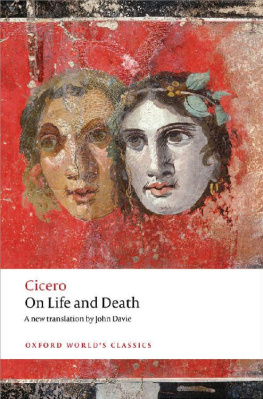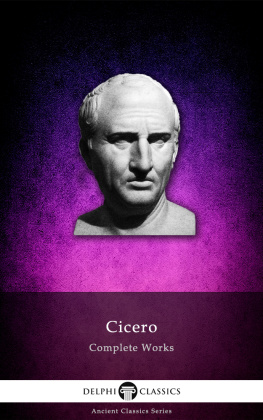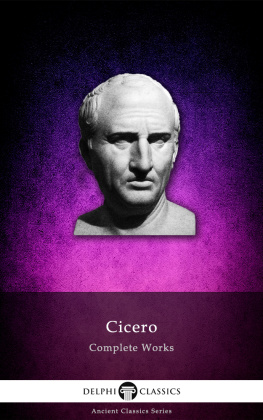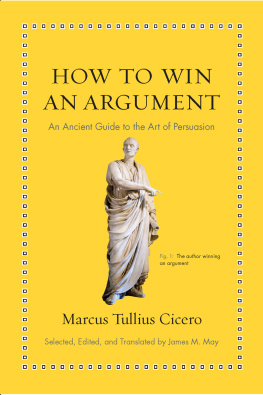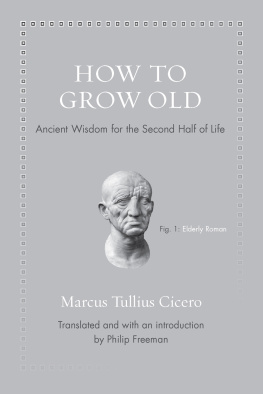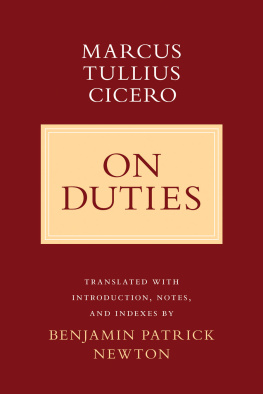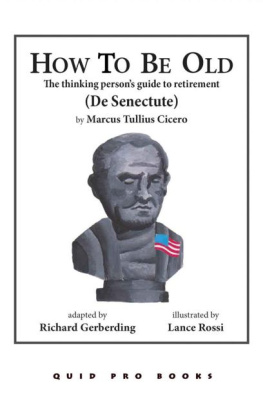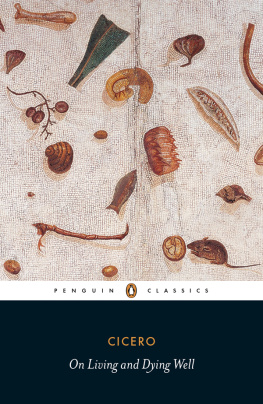Cicero
On Life and Death

Translated by
John Davie
Edited with an Introduction and Notes by
Miriam T. Griffin


Great Clarendon Street, Oxford, ox 2 6 dp United Kingdom Oxford University Press is a department of the University of Oxford. It furthers the Universitys objective of excellence in research, scholarship, and education by publishing worldwide. Oxford is a registered trade mark of Oxford University Press in the UK and in certain other countries
Translation John Davie 2017
Editorial matter Miriam T. Griffin 2017
The moral rights of the authors have been asserted
First published as an Oxford Worlds Classic 2017
Impression: 1
All rights reserved. No part of this publication may be reproduced, stored in a retrieval system, or transmitted, in any form or by any means, without the prior permission in writing of Oxford University Press, or as expressly permitted by law, by licence or under terms agreed with the appropriate reprographics rights organization. Enquiries concerning reproduction outside the scope of the above should be sent to the Rights Department, Oxford University Press, at the address above
You must not circulate this work in any other form and you must impose this same condition on any acquirer
Published in the United States of America by Oxford University Press 198 Madison Avenue, New York, NY 10016, United States of America
British Library Cataloguing in Publication Data
Data available
Library of Congress Control Number: 2016951441
ISBN 9780199644148
ebook ISBN 9780191662287
Printed in Great Britain by Clays Ltd, St Ives plc
Contents
The fortunes of Marcus Tullius Cicero, Romes greatest orator, mirrored those of the city of Rome, which he first celebrated, then lamented. He was born at the end of the second century bc when Rome was a republic already ruling a large empire in the western Mediterranean and rapidly extending her power in the east. His career was one of intense activity in politics, the law courts, and the administration, mostly in Rome. It did, however, include a short period of exile in Macedonia and a spell as governor of the province of Cilicia in modern-day Turkey. He died as a victim of the Triumvirate, a legally constituted body comprising the trio of Octavian, Antony, and Lepidus: these men had defeated the Republican cause in the civil war that followed the death of Julius Caesar. After Ciceros death in 43 bc , the three would fall out with one another and, after the ejection of Lepidus from the coalition, the remaining two would plunge Rome into more civil conflict, from which the Republic would never recover. Instead, the victor, Octavian, the youngest of the Triumvirate, would, as the Emperor Augustus, create the new political system of the Principate and unify the empire by a land route connecting east and west. Augustus was to call Cicero a learned man and a lover of his country.
A New Man in the Senate
For Cicero, Rome was both a magnificent city and a cosmopolitan hub of empire. Still more important for him, it was identified with the Republic, a political system that centred on the senate house and the forum, where political speeches were made and important trials held. Elections and legislative decisions also took place exclusively in Rome, so that the increasing number of Roman citizens in Italy and the provinces were without representation, unless they travelled to the capital. Cicero himself was born on 3 January 106 bc in the town of Arpinum, a citizen community for which he retained considerable affection. He was what the Romans called a new manthat is, the first in his family to achieve high public officerising through the requisite series of magistracies to the highest, the consulship. His mother, Helvia, came from a family that could boast senatorial office holders early in the previous century. His paternal grandfather had held local office, but his father was not very robust and remained a rather bookish gentleman of leisure. He saw to it that his son had a good education, studying at the house of Lucius Licinius Crassus, one of the great orators and statesmen of the day. Another of the boys to appreciate the tutors gathered there was probably Titus Pomponius Atticus, who remained a close friend of Cicero for life. The two then went on to study law with Quintus Mucius Scaevola Augur, a great jurist. All of this was wonderful preparation for a career in public life, where the two chief means of achieving prominence were oratorical skill and military prowess. It was in the senate house and the forum that the aristocrats of Rome devised and enforced the laws, as well as inculcating in the newcomers their own code of behaviour.

